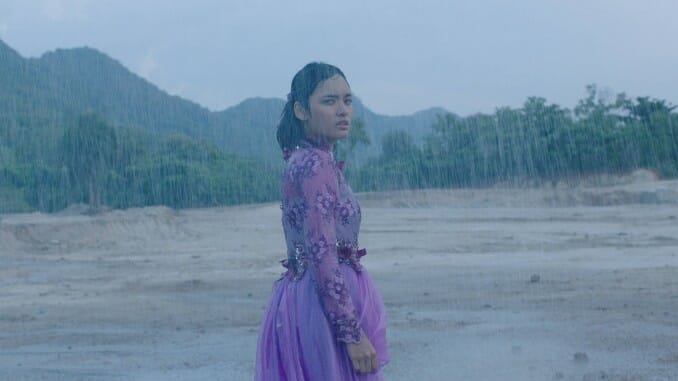
“Everyone knows that if something purple has gone missing, you must have stolen it.” Sixteen-year old Yuni (Arawinda Kirana) is in the office of her school’s bemused guidance counselor, once again being berated for her lilac-related larceny. Her obsession is a source of bafflement to everyone around her, friend and foe alike; a sensible girl, smart and popular, it just doesn’t seem to fit her persona. That doesn’t matter to Yuni. If there’s something purple in her immediate vicinity—a flask, a scrunchie, a folder—it’s hers. And that’s all there is to it.
Elsewhere in her final year of high school, Yuni is struggling to grasp what her future will look like. As a talented scientist, a university course is an appealing potential option, but to get the necessary scholarship will require top marks in every one of her school subjects—including Indonesian Literature, her one academic weakness. She must remain unmarried to be granted the scholarship, and much of her free time is spent fending off proposals from unappealing prospects rustled up by her traditional grandmother. With each refusal, the neighbors’ whispers grow louder.
Then there’s Yoga (Kevin Ardillova), a sweet budding poet a couple of years Yuni’s junior who’s head-over-heels in love with her. Always gazing wistfully in her direction, Yoga has a front row seat as Yuni’s life starts to spiral out of control.
For as long as we live in a world of oppressive patriarchal societies, we’ll have films about young women struggling to come of age within them-Yuni sits comfortably alongside Mustang and Papicha as one of the best recent works of that unfortunate subgenre. And while there is an inevitability to the course of events in director Kamila Andini’s movie, the exemplary execution of each element makes the all too familiar feel freshly upsetting.
As the title character, and in her first leading role, Kirana is magnetic. For Yuni and her peers, girlhood is too short, womanhood strikes far too soon and occupying the slim ground between the two states is a disconcerting, overwhelming experience. Kirana’s portrayal of that untenable position is desperately moving, even more so when contrasted with the short, happy period of freedom she’s allowed at the movie’s opening. Ardillova’s charming depiction of teenage infatuation radiates a tangible physical discomfort; it takes half the film’s duration for him to work up the courage to even look Yami in the eye. While there’s plenty of endearing humor to Yoga’s awkwardness, the erosion of it as the movie progresses underlines the central theme of prematurely-ended childhoods. We see him discover the truth of his world, and it’s heartbreaking. Of course, as a boy, he gets a much easier ride of it; as Yuni is driven towards a loveless marriage and away from her professional aspirations, Yoga only loses the luxury of his naivety.
Yuni is Andini’s third feature—she also co-wrote the screenplay with Prima Rusdi—and her direction is effortless and unobtrusive. She handles the tonal shift from giddy teenage romance to wrenching tragedy with admirable ease, letting us gradually feel the inescapability of those walls closing in. Andini avoids distracting stylistic flourishes, but many of her shots have a haunting resonance; foremost among them is in a later scene, where her camera gently floats over Yuni and her friends gathered in one of their bedrooms, curled up in a supportive huddle as Sarah (Neneng Wulandari) recounts a deeply traumatic experience. The quiet power of that moment, five girls trying to buoy each other against a society determined to squash them, lingers long in the mind after the film has moved on.
Though the larger direction of the plot seems almost fated, before it gets to that final destination, Yuni takes some interesting, unexpected side streets. The prospect of mandatory school virginity tests is raised early and prominently, but meets an unanticipated offscreen obstacle. Yuni’s crush on her literature teacher (Dimas Aditya) is at first treated as an innocent teenage fantasy, until several further revelations cast a bitterly ironic light on her initial feelings. Within the unavoidably rigid framework of the larger narrative, individual story beats remain bracing in their slipperiness, refusing to conform to what we might expect.
Which returns us to our protagonist, and her purple obsession. By establishing it as the first concrete information we hear about Yuni, Andini appears to set the stage for some revelatory backstory, or even—God forbid—an explanatory flashback. Neither arrives. While the door is left wide open for symbolic interpretation (a quick Google search variously describes it as the color of creativity, mourning, wisdom, wealth…) the true reason behind her love of purple remains a mystery throughout. It’s for her, and only for her. In a film so very much about the crushing of youthful female independence, that she gets to retain even something as seemingly trivial for herself is a small but precious blessing.
Director: Kamila Andini
Writer: Kamila Andini, Prima Rusdi
Stars: Arawinda Kirana, Kevin Ardilova, Dimas Aditya
Release Date: March 4, 2022 (Glasgow Film Festival)
Chloe Walker is a writer based in the UK. You can read her work at Culturefly, the BFI, Podcast Review, and Paste.